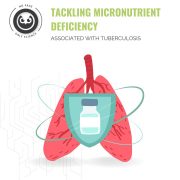Tuberculosis and all the micronutrients you’re losing because of it
Mycobacterium Tuberculosis is the bacteria that are responsible for tuberculosis. While the general assumption about TB is that it affects just the lungs, the condition can affect other body parts like the spine, brain, and kidney. The key to dealing with Tuberculosis is early diagnosis, proper medication, and a clean diet that makes up for the loss of nutrition that comes with the condition. In this article, we’ll talk more about nutritional loss and how to tackle it.
What is the correlation between chronic TB and malnutrition?
There’s always a high correlation between any chronic condition and malnutrition. In people with tuberculosis, this malnutrition is the result of malabsorption or the body’s inability to absorb and properly synthesize all the nutrients in the food consumed, reduced intakes due to poor appetite, or the treatment itself, sometimes.
Studies show that people that are battling tuberculosis often have lower levels of vital vitamins and minerals. More often than not, the complications and secondary illnesses that come with tuberculosis are purely the result of this nutrition loss.
Vitamin deficiency in tuberculosis patients
Patients with Tuberculosis often show lower levels of essential vitamins. Here are a few such vitamins and the functions they help with.
- Vitamin A – Enables normal bodily functions like vision, the immune system, and reproduction.
- Vitamin C – Contributes to the development and repair of all body tissues. Essential for growth.
- Vitamin D – Takes care of the immune function. Protects bone, muscle, and heart.
- Vitamin E – Helps in vision, and reproduction, and is essential for the health of your blood, brain, and skin.
It is not a secret that the functions that these vitamins are responsible for our normal bodily functions and the loss of these vitamins can sabotage a lot of vital organs. Most of the time, people with tuberculosis do not properly compensate for the loss of vitamins, and the complications can be severe.
Mineral deficiency in tuberculosis patients
Patients with TB often also have to tackle mineral loss in their bodies. Here are a few minerals that are generally found in lower quantities/ratios in TB patients and what complications they might lead to.
- Selenium – Myodegenerative diseases, such as muscle weakness, depression, anxiety, and confusion.
- Iron – Anemic, tired, and short of breath.
- Copper – Muscle weakness, anemia, low white blood cell count, neurological problems, and paleness.
- Zinc – Hair loss, diarrhea, eye, and skin sores, and loss of appetite.
If you can take proper measures like a well-rounded diet that compensates for the loss of these essential minerals and constantly monitor symptoms, you can tackle tuberculosis and the complications that come with it effectively.
Dietary solutions
Be very informed of your dietary choices when you’re fighting tuberculosis. Do not follow a blanket diet plan that you do not fully understand. Compensate for the loss of vitamins and minerals, and eat food that’s rich in vitamins and minerals. As Yoda always insisted, a well-balanced diet with proper scientific backing is the best way to stop a chronic condition from worsening or slowing down the complications that come with it. In the case of tuberculosis, make sure that your diet contains all the vitamins and minerals that you are losing.
Get in touch with the nutritionists here at Optimal Nutrition Protocol, and we’ll help you arrive at an optimal dietary plan that’ll help you tackle tuberculosis better.



